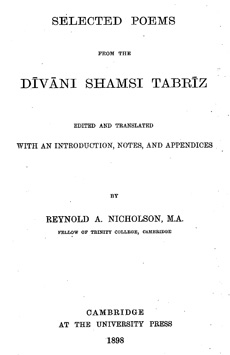| PREFACE
About six years ago, when I consulted Professor Robertson Smith, whose kindness and heroic unselfishness none of his pupils can ever forget, as to what I should make the subject of the dissertation expected from candidates for a Trinity Fellowship, he suggested the Divani Shamsi Tabriz, in other words, the lyrical poetry of Jalalu'ddin Rumi. I was the more ready to follow his advice as the Sufi doctrines had even then begun to inspire me with the strange and irresistible fascination which a religion of love and beauty exercises over certain minds. Accordingly, Mr E. G. Browne having lent me his copy of the Tabriz Edition of the Divan, I worked through it page by page, selecting the poems that pleased me best and translating them in prose or verse. The present volume is an outcome of that experiment. It is not, however, merely a réchauffé. My original dissertation was based upon a single text and left many difficulties unsolved. In 1894 I collated a splendid manuscript of the Divan preserved in the Vienna Hofbibliothek, and on my return I examined one of equal importance, which the authorities of the Leyden University Library generously placed at my disposal. The texts thus obtained I have corrected and supplemented by reference to MSS. in the British Museum and elsewhere. As regards interpretation also much has been gained. In a wider knowledge of Sufi literature, and especially of the Masnavi, I found the key to passages which seemed hopelessly obscure. The comparative methodmay be abused; its value is beyond dispute. Sufiism has few ideas, but an inexhaustible wealth and variety of illustration. Among a thousand fluttering masks the interpreter is required to identify each old familiar face. Now one mask reveals more than another, and when that has been penetrated, its neighbour can no longer dissemble the likeness which hitherto remained unrecognised. I do not, of course, pretend to have understood everything: Siifiism is neither an exact science nor a popular history of the Creation. This enigmatic and ambiguous style, of which the Divan is a masterpiece, will always leave ample room for conjecture, even though its chief characters are easily deciphered. I trust that my explanatory notes, if occasionally they prove to be beside the mark, may nevertheless contribute to a better appreciation of the greatest mystical poet of any age.
While the Masnavī is accessible in the scholarly abstract of Mr Whinfield and the laborious but amazingly unpoetical version of Bk. I. by Sir James Redhouse, the Divan, scarcely inferior in merit or fame, has been less fortunate. There is no English edition; Austria has given us Rosenzweig's Auswahl (1838), and the clumsy translations of Von Hammer in his Schöne Redekünste Persiens. For a notice of both the reader is referred to the Introduction. I have included three odes which appear in the Auswahl; the rest are now published in Europe for the first time. The task of selection was not a simple one, and I have necessarily relied on my own taste and feeling. If my book were not addressed to students of Persian rather than to lovers of literature, I should have been tempted to imitate Abu Tammām, whose Hamāsa is a compilation of verses torn from their context. Such a plan is peculiarly favoured by the loose structure of the ghazal, where couplets complete in themselves are strung together in the slightest fashion. But as no writer can fairly be judged by fragments, however fine, I have endeavoured to make this anthology a true and sufficient reflexion of the whole Divan.
My translation seeks to reconcile the claims of accuracy and art: it is therefore in prose. Obviously English verse cannot convey the full verbal sense of oriental poetry without lapsing into grotesque doggerel; the translator must either profess a general adherence to his author's meaning (see Appendix II.) or, rising above the letter, he must catch the elusive spirit of his original and reproduce it in a worthy form. Of this, the highest and rarest kind of translation, Fitzgerald's 'Omar Khayyam is a classic example. I have done my best to avoid gratuitous ba¬nalities, when no misapprehension was possible. Thus I have not rendered saffi Ni'al by 'shoe-rack,' nor have I described a burning heart as' roast-meat.' Although some Persian compounds can hardly be englished except by coining equivalent terms, I have taken warning from the sad fate of more than one inventor. 'Nubiquity' and nulliquity' are terrible epitaphs.
Finally, my warmest thanks are due to Professor Cowell, who lent me his two manuscripts of the Divan; to Mr E. G. Browne, who since I began to study Persian has never grudged me the benefit of his unrivalled knowledge and experience; to Mr G. Lowes Dickinson, who permitted me to make use of 'an unpublished dissertation on Plotinus; and above all to Professor Bevan, who not only read the proof-sheets throughout but assisted me with many ingenious and important suggestions.
I would also declare my obligation to the staff of the Cambridge University Press for the admirable way in which they have printed a very troublesome text.
Trinity College
July, 1898 | 